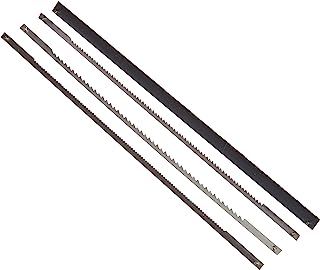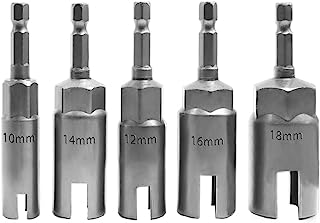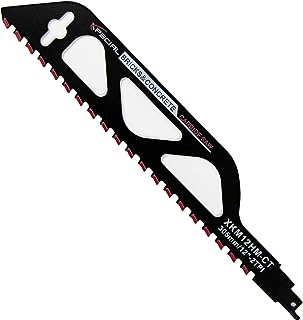5 important factors worth considering when looking for the best reciprocating saw blade for masonry
When buying a reciprocating saw blade for masonry, it’s important to consider certain factors. The right blade can improve the efficiency and precision of your work, which affects the quality of the outcome. Details like the material of the blade, teeth per inch ratio, and durability all play a crucial role in making sure your cutting tasks go smoothly. By making a smart choice based on these factors, you can save time and effort and have a better cutting experience.
See our guide to the best reciprocating saw blade for masonry.
Material of the blade
When buying reciprocating saw blades for masonry work, the material of the blade is very important. Choosing a high-quality blade made from materials like carbide or bi-metal can make a big difference in getting precise cuts and making the cutting process more efficient. These strong materials are made to handle tough masonry jobs, like cutting through concrete, brick, or stone, and can last a long time.
Picking the right blade material can make a big difference in how well the reciprocating saw works, leading to smoother cuts and less wear on the blade and the tool. Although a top-quality blade made from the best materials might cost more upfront, the long-term benefits make it worth it. By focusing on quality materials when buying reciprocating saw blades for masonry jobs, DIYers and professionals can improve their cutting experience, get better results, and enjoy their work even more.
Blade length and thickness
Choosing the right reciprocating saw blade for masonry work is crucial. Both the length and thickness of the blade play important roles in how well it will perform. A longer blade can help you reach tight spaces and tricky angles common in masonry projects. It also allows you to cut through different depths of material without needing to make constant adjustments. On the other hand, the thickness of the blade affects how durable and stable it is when cutting tough materials. A thicker blade can withstand intense cutting without bending or breaking, leading to a longer lifespan and consistent results. Balancing length and thickness is key for precise and efficient cutting in masonry projects, giving you more control and a smoother cutting experience.
In masonry work, the right blade length and thickness are essential for a successful cutting experience. A longer and thicker blade can provide the strength and reach needed for materials like brick and concrete. Investing in a quality reciprocating saw blade that balances length and thickness can result in cleaner cuts, reduced vibrations, and improved comfort while cutting. By choosing blades that meet the specific needs of masonry tasks, professionals and DIYers can enhance their cutting abilities and achieve better results in their projects.
Type of teeth (e.g. carbide tipped, diamond grit)
Choosing the right reciprocating saw blade for masonry work is crucial for efficient and high-quality cutting. Carbide-tipped teeth are strong and durable, making them a popular choice for cutting tough materials like concrete and brick in the construction industry. These teeth last a long time and provide precise cuts through dense masonry, helping workers be more productive on the job. On the other hand, diamond-grit teeth are great for cutting extremely hard materials like reinforced concrete and stone. They cut quickly and precisely, saving time and effort on challenging projects. Each type of tooth has its own advantages and is best suited for specific tasks. By understanding the benefits of carbide-tipped and diamond-grit teeth, users can choose the right blade for their project and ensure top performance when using a reciprocating saw for masonry work.
TPI (teeth per incfor cutting efficiency
When choosing a reciprocating saw blade for working with masonry, the number of teeth per inch (TPI) is crucial for cutting efficiently. Picking the right TPI can make a big difference in whether your cut is smooth and precise or rough and time-consuming.
For masonry projects, it’s usually best to choose a blade with a lower TPI because it allows for more controlled cutting through tough materials like bricks or concrete blocks. A lower TPI means each tooth on the blade can dig deeper into the material, resulting in a cleaner cut with less effort.
Some people might argue that a higher TPI blade is more versatile and can handle a wider range of materials. However, when it comes to masonry work, accuracy is key. By selecting a lower TPI blade specifically made for masonry, you can achieve smoother cuts, minimize vibrations, and extend the lifespan of both the blade and your saw.
By prioritizing the right TPI for your masonry cutting needs, you can have a more satisfying and efficient cutting experience that saves you time, effort, and potential mistakes in the long term.
Compatibility with your reciprocating saw model
Selecting the right reciprocating saw blades for masonry work is crucial. It’s important to choose blades that work well with your specific saw model. Using high-quality blades made for masonry tasks can make your cutting jobs more efficient and accurate. Matching the blades to your saw model helps to prevent slipping or inefficiency during cutting. When looking at blade options, think about factors like length, tooth design, and material to make sure they perform well and last long.
Picking blades that are designed for your saw model not only improves your work quality but also makes cutting safer. Using blades that aren’t compatible with your saw can cause more vibration, kickback, or damage, which is dangerous for you and your work. By selecting blades that work well with your saw, you create a safe cutting environment that is efficient and precise. Compatible blades also help your blades last longer, reducing how often you need to change them and maintain them, making cutting overall better. Prioritizing compatibility between your reciprocating saw and masonry blades is a proactive way to get great cutting results while keeping your cutting process safe and reliable.
Conclusion
Investing in a top-notch reciprocating saw blade made for cutting masonry can improve your cutting experience and make your work more efficient. These special blades are durable, precise, and perform well, making them a great tool for anyone working with masonry materials. Choosing the correct blade for the job ensures better results and saves you time and energy. Using these blades can enhance your work and help you tackle masonry projects with skill and ease.


